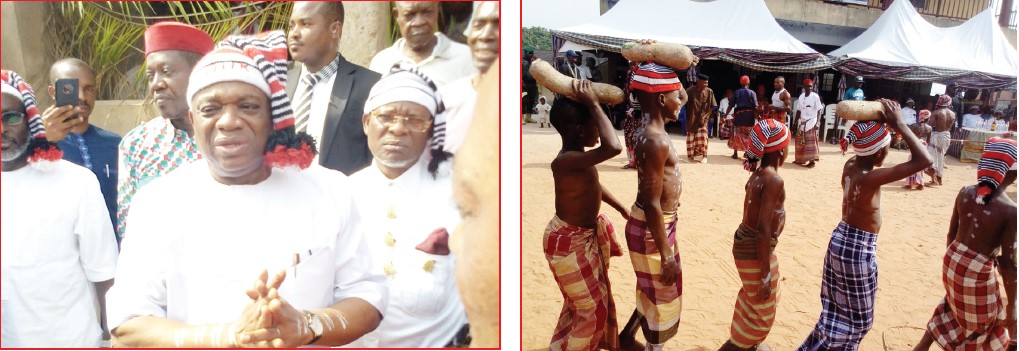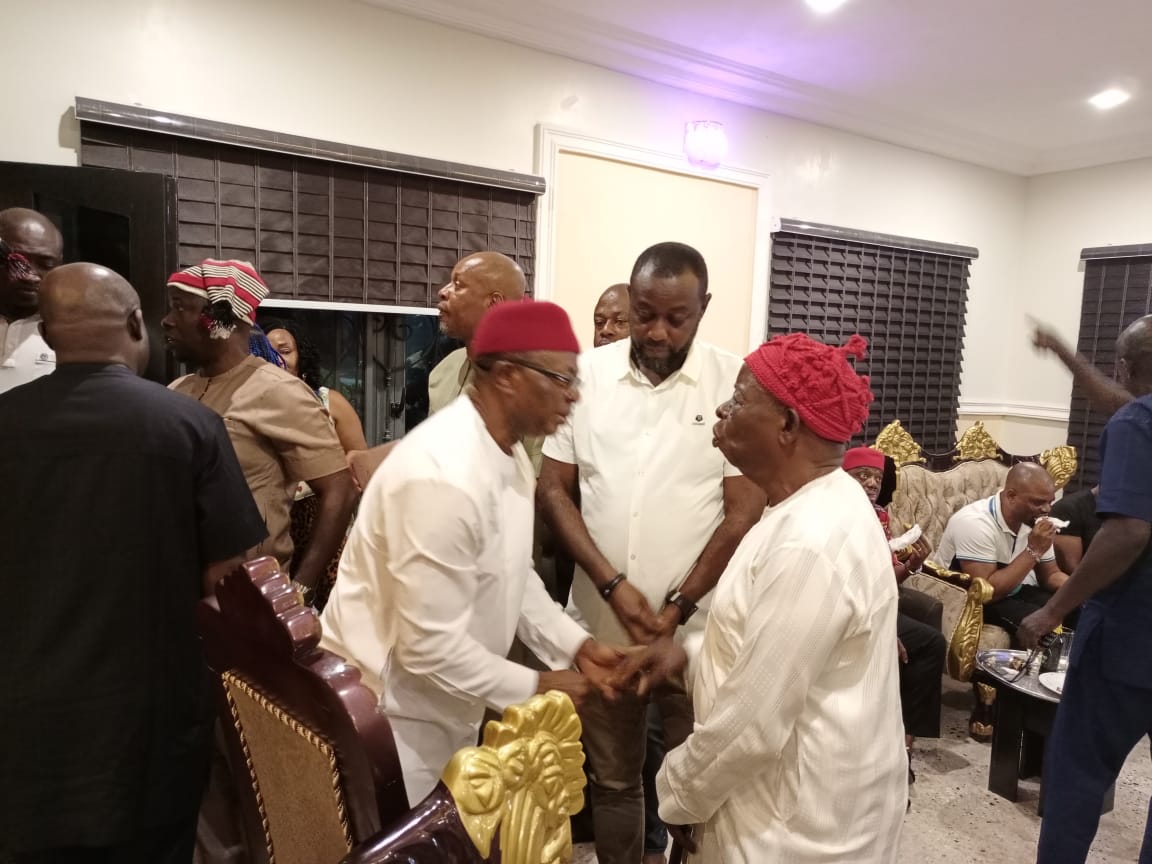Igbere Cultural Festival: When Culture Blends With Value, Virtues
Festival of joy
Year’s edition of Igbere Cultural Festival held on January 2, was decentralised. Each of the 13 villages performed its cultural exhibitions at their village square. The reason, according to Senator Orji Uzor Kalu, the convener, was to allow more people, especially the younger generation, who would ordinarily find it difficult to travel to the central point of the previous editions, access and participation. Previous editions were centralized at the Senators residential field at Camp Neya, where the troupes and spectators/guests gathered. But beyond the privilege of accessibility to every strata of the community to be part of the festival, the disparate arrangement, though tedious and stressful, also highlighted the essential ingredients of oral literature because the composite and complementary performance of prose, poetry and drama in the traditional setting is the very elegance of oral literature. The genres were performed in situ to the delight of the audience.
*It’s uniqueness*
The Festival was special because it had the full complement of all the components of the peoples way of life, performed at the traditional village square environment. Previous editions were centralized at the Camp Neya, the residential field of the convener, Senator Orji Uzor Kalu. Moving from one village to another also afforded one the opportunity to explore the community that has combined the serenity and opulence of modern city with the rustic simplicity of communal and traditional existence. Igbere is a close knit Community moored in its unique cultural meme. The first port of call was Agbo, where the oji oku ala oru (one who returns from farm with fire) cultural group performed.
The performance was veiled in elaborate symbolism and language that can be decoded only by initiates. The performers, made up only of young and grizzled males, attired in george material and the strong ones (tiger) cap, to complement the costume, filed out carrying tubers of yam and a long raffia bamboo that bore the live fire, danced in a circle for a while with call-response chants and incantations and then huddled in a corner of the square close to the booth where items of divination were laid. Someone, probably the Chief priest, consulted the Oracle in an earthen ware placed on a grind stone, marked with lines of traditional chalk, relayed its message to the Senator and the crowd. Chief Dike Dike, a community leader explained that in ancient times the oracle was consulted to tell whether the way/road would be clear and accident free for their sons and daughters to return from their sojourn.
Excited participants
Next was the Ogudu war dance of Eziama Igbere. The dance, according to Bucknor Ekeoma, was performed in celebration of victory or conquest in war, wrestling or any other victory. At Amaukwu, the Eke Oba cultural dance signified Igbere cultural calendar in which the community gather at the end of the year to thank their god and celebrate his protection and what he has helped them to accomplish. Amakpo Igbere performed the Uronyi Dance, which marks the beginning of yam harvest and eating in Igbere. Ibinanta came with Agrey Dance, a social dance for special occasions. The Enyi (Elephant) royal dance of dignity was performed by Amankalu. It is a special dance performed once in four years on special occasions. Amaofufe Igbere performed the Obi buru otu (unity of purpose) cultural dance. Ibinaukwu Igbere performed the Ekere Abu, while Okafia had the Okonko masquerade. At Ohumuola it was ojonkwu social masquerade. Others are Amoji with fertility masquerade and atilogwu; Amiyi, Ikoro cultural dance and Umusi, Oba cultural dance. Traditional musical instruments like metal and wooden gong, drums, earthen pots and clapper sticks made from Indian bamboo, were used in all the locations.
*Kalu speaks*
Interestingly, Senator Kalu in company of his guest, the Speaker of the Djibouti National Assembly, Muhammad Ali Humad and his family made the round to the 13 villages and watched the display. At the end of the event the entourage retired to Kalu’s mother’s residence, Elder Chief Mrs Eunice Uzor Kalu, on the precarious hilly terrain of Igbere for dinner. In a pre prandial chat, the Senate Chief Whip announced the prizes of the festival. Ibinanta and Eziama jointly took the first position; Amankalu, Okafia and Umusi, Second position, while Ibinaukwu and Ohumuola took the third position. The prize money would be shared among the winners in each category, he said. The Abia North Senator described culture as a vehicle for unity and inculcation of values of love and selfless service to community and humanity and therefore must be sustained. The former governor of Abia State explained that the event was deliberately shifted to the communities to allow more people to participate and have access to the festival.

*Essence of the event*
According to the Senator, culture was the string that has bound the people together in unity adding that the festival would be sustained as a means of teaching the younger generation the value of unity and love. “We don’t want any one to cause trouble here. We have told anybody that will cause trouble here that we will take him away. We don’t want anybody to cause trouble for us in this community. If we see you with trouble we come after you and take you away. It is the law of the 13 villages, it’s not my law,” he said. “You can see the joy and excitement on the faces of the people, the young, the old,children and women. When we were doing it at Camp Neya only few people could attend but now they are happy enjoying themselves and still dancing in their communities till now. “You see we didn’t speak in the 13 villages. It is not about politics, it’s about our people. It’s just to resonate our culture, the culture has to be brought back,”
*Kalu said.*
Learn from us
The lawmaker called on other Igbo communities to emulate the practice, which he said was the reason Igbere was peaceful. He added that next year’s festival would be better organised because the president general of the community would be involved and enough time given for preparations. Expressing his impression of the cultural festival, the Speaker of Djibouti National Assembly, Muhammad Ali Humad, said he was excited to witness the festival and the unity it engendered among the people, adding that he would take the experience back to his country. According to him, culture has given Africa its true identity. “As soon as I go back to my country I will show them what I have seen in Nigeria. It’s an example of what Nigeria and indeed Africa should be and work together for cultural exhibitions. It is the culture that brings the value of Africans from what we have seen today,” he said.
*Restoration of values*
Also speaking, the Executive Secretary, OUK Foundation Elder Mrs Jemima Ola Kalu, said the 2023 edition of Igbere Cultural Festival was for “creativity and restoring our cultural heritage.” She explained that to give impetus to the cultural renaissance the event had to be conducted in the various villages to give especially, the younger generation the sense of participation and sustainability. “If they all came to Camp Neya, the children may not have the opportunity of coming, but we want to groom them so that as the old people are phasing out the young ones will continue to uphold the culture,” she said. In his remarks, APC governoship aspirant, Chief Daniel Eke, expressed joy that “our Senator is organising this for the community to show case our culture to the world.” He described the event as a unifying factor for a community built with love. Igbere is the country home of Senator Orji Uzor Kalu and one of the clans that make up Bende Local Government Area of Abia State. It is made up of 13 independent, autonomous communities, each with its village head and elders council, administrative, social and political structure.
The festival promises to hold for 2 days next year January 2nd and 3rd.
……Igbere Mirror Reports.




